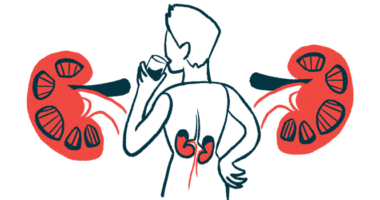Impaired kidney function is common in hypoparathyroidism
Calcium deposits were seen in the kidneys of 10% of patients

About one in five adults with hypoparathyroidism had impaired kidney function, according to a study based on real-life data.
Ultrasounds also revealed calcium deposits in the kidneys of 10% of patients, which were predicted by low phosphate in the bloodstream and longer disease duration. The deposits didn’t appear to affect kidney function, data showed. The findings highlight “the importance for regular monitoring of renal function,” the researchers wrote in “Renal complications in chronic hypoparathyroidism – a systematic cross-sectional assessment,” in Frontiers in Endocrinology.
The parathyroid hormone (PTH) regulates the bloodstream balance of calcium and phosphorus. When calcium drops, PTH signals the kidneys to uptake it, release phosphate, and produce active vitamin D to absorb calcium and phosphate in the gut.
People with hypoparathyroidism have low PTH, resulting in low calcium and high phosphorus levels, which can trigger symptoms such as muscle cramps, pain, and twitching.
Treatments include vitamin D and calcium supplements. Many patients still see fluctuating calcium levels and excess calcium in the urine, which increases the risk of kidney disease. The buildup of calcium deposits (calcifications) can also occur.
“Although renal long-term complications are acknowledged in chronic hypoparathyroidism (HPT), standardized investigations are scarce,” said researchers in Germany who sought to identify the risk factors associated with kidney impairment and calcium deposits in 161 well-characterized adults with hypoparathyroidism (NCT05585593). The patients were matched to a control group of healthy people based on age, sex, body mass index (body fat content), smoking status, diabetes, and high blood pressure.
Impaired kidney function in hypoparathyroidism
Almost half the patients were treated with oral calcium supplements and active vitamin D (46.4%), and about one in five was taking cholecalciferol, or vitamin D3 (21.7%). Nine were treated with PTH replacement therapy, to administer a version of PTH to boost its levels, plus supplementation.
Impaired kidney function was found in 21% of the hypoparathyroidism patients, as assessed by the estimated glomerular filtration rate (eGFR), a standard measure of kidney function. Lower eGFR values indicate worse kidney function.
Excess calcium loss in the urine (hypercalciuria) occurred in 43% of male and 39% of female patients, of whom 28.1% received thiazide diuretics, which help the kidneys absorb more calcium. Despite this, 51.4% remained hypercalciuric.
High levels of creatinine in the blood, a sign of kidney disease, were correlated with older age. Low eGFR correlated with longer disease duration and elevated blood calcium, specifically, albumin-corrected serum calcium.
Compared with the matched controls, hypoparathyroidism patients had significantly lower eGFR values, with the difference increasing with age. Blood levels of calcium and magnesium were also lower, and phosphate concentrations were higher among patients over controls. The differences persisted after correcting for thiazide.
A kidney ultrasound of 150 patients detected kidney calcium stones or deposits in 10% of cases. Of these, 3.3% had kidney stones, or hard deposits made of minerals and salts, and 7.3% had generalized calcium deposits. One patient had both.
Values for urine calcium excretion over 24 hours, spot urine calcium, urine calcium-creatinine-ratio (UCCR), and diuretic daily dose were significantly different between patients with kidney calcium deposits and those without them.
“The daily dose of diuretics was higher in patients with renal calcifications, which was most likely a consequence of observed renal calcifications or hypercalciuria,” the researchers wrote.
The two groups were similar regarding the cause of hypoparathyroidism, disease duration, eGFR, and intake of oral calcium supplements, active vitamin D, vitamin D3, and magnesium.
“Our data revealed no association of renal calcifications with renal function impairment,” the researchers said.
Significant predictors of kidney calcium deposits included lower phosphate concentrations in the bloodstream and longer disease duration. A 24-hour urinary calcium excretion was elevated in those with kidney deposits, but the difference wasn’t statistically significant.
When the patients who received PTH replacement therapy were excluded from the calculations, 24-hour urine calcium excretion was a significant predictor for kidney calcium deposits, but not disease duration.
“In this study we found an increased prevalence of impaired renal function among patients with chronic [hypoparathyroidism] compared to matched individuals of the general population,” said the researchers, who called hypercalciuria an “important risk factor” for developing renal calcifications that often occur under standard therapy with calcium and vitamin D.







